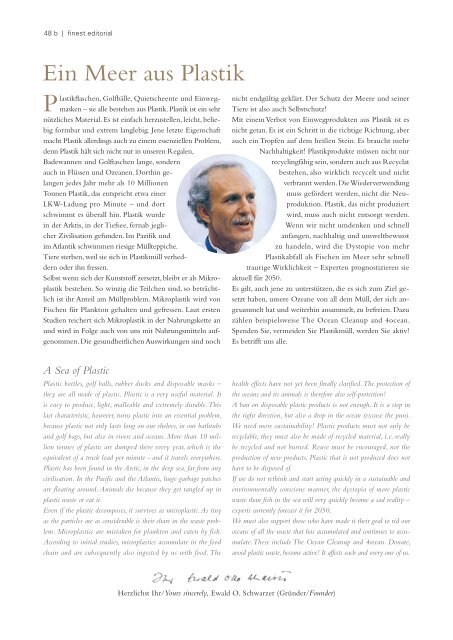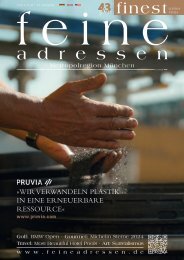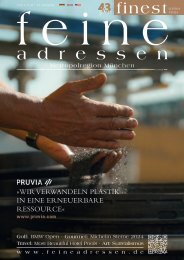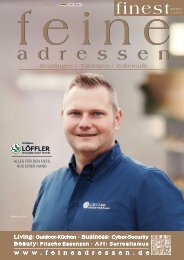»feine adressen – finest« – RTZ 3 20
Interview: Laura Siegmund · Automobile: Porsche Taycan · Gourmet: Kaffee · Fashion: Umweltbewusste Herbstmode
Interview: Laura Siegmund · Automobile: Porsche Taycan · Gourmet: Kaffee · Fashion: Umweltbewusste Herbstmode
Sie wollen auch ein ePaper? Erhöhen Sie die Reichweite Ihrer Titel.
YUMPU macht aus Druck-PDFs automatisch weboptimierte ePaper, die Google liebt.
48 b | finest editorial<br />
Ein Meer aus Plastik<br />
Plastikflaschen, Golfbälle, Quietscheente und Einwegmasken<br />
<strong>–</strong> sie alle bestehen aus Plastik. Plastik ist ein sehr<br />
nützliches Material. Es ist einfach herzustellen, leicht, beliebig<br />
formbar und extrem langlebig. Jene letzte Eigenschaft<br />
macht Plastik allerdings auch zu einem essenziellen Problem,<br />
denn Plastik hält sich nicht nur in unseren Regalen,<br />
Bade wannen und Golftaschen lange, sondern<br />
auch in Flüssen und Ozeanen. Dorthin gelangen<br />
jedes Jahr mehr als 10 Millionen<br />
Tonnen Plastik, das entspricht etwa einer<br />
LKW-Ladung pro Minute <strong>–</strong> und dort<br />
schwimmt es überall hin. Plastik wurde<br />
in der Arktis, in der Tiefsee, fernab jeglicher<br />
Zivilisation gefunden. Im Pazifik und<br />
im Atlantik schwimmen riesige Müll teppiche.<br />
Tiere sterben, weil sie sich in Plastikmüll verheddern<br />
oder ihn fressen.<br />
Selbst wenn sich der Kunststoff zersetzt, bleibt er als Mikroplastik<br />
bestehen. So winzig die Teilchen sind, so beträchtlich<br />
ist ihr Anteil am Müllproblem. Mikroplastik wird von<br />
Fischen für Plankton gehalten und gefressen. Laut ersten<br />
Studien reichert sich Mikroplastik in der Nahrungskette an<br />
und wird in Folge auch von uns mit Nahrungsmitteln aufgenommen.<br />
Die gesundheitlichen Auswirkungen sind noch<br />
nicht endgültig geklärt. Der Schutz der Meere und seiner<br />
Tiere ist also auch Selbstschutz!<br />
Mit einem Verbot von Einwegprodukten aus Plastik ist es<br />
nicht getan. Es ist ein Schritt in die richtige Richtung, aber<br />
auch ein Tropfen auf dem heißen Stein. Es braucht mehr<br />
Nach hal tig keit! Plastik produkte müssen nicht nur<br />
recyclingfähig sein, sondern auch aus Re cyc lat<br />
bestehen, also wirklich recycelt und nicht<br />
verbrannt werden. Die Wie der ver wen dung<br />
muss gefördert werden, nicht die Neuproduktion.<br />
Plastik, das nicht produziert<br />
wird, muss auch nicht entsorgt werden.<br />
Wenn wir nicht umdenken und schnell<br />
anfangen, nachhaltig und umweltbewusst<br />
zu handeln, wird die Dystopie von mehr<br />
Plastikabfall als Fischen im Meer sehr schnell<br />
traurige Wirk lichkeit <strong>–</strong> Experten prognostizieren sie<br />
aktuell für <strong>20</strong>50.<br />
Es gilt, auch jene zu unterstützen, die es sich zum Ziel gesetzt<br />
haben, unsere Ozeane von all dem Müll, der sich angesammelt<br />
hat und weiterhin ansammelt, zu befreien. Dazu<br />
zählen beispielsweise The Ocean Cleanup and 4ocean.<br />
Spenden Sie, vermeiden Sie Plastikmüll, werden Sie aktiv!<br />
Es betrifft uns alle.<br />
A Sea of Plastic<br />
Plastic bottles, golf balls, rubber ducks and disposable masks <strong>–</strong><br />
they are all made of plastic. Plastic is a very useful material. It<br />
is easy to produce, light, malleable and extremely durable. This<br />
last characteristic, however, turns plastic into an essential problem,<br />
because plastic not only lasts long on our shelves, in our bathtubs<br />
and golf bags, but also in rivers and oceans. More than 10 million<br />
tonnes of plastic are dumped there every year, which is the<br />
equivalent of a truck load per minute - and it travels everywhere.<br />
Plastic has been found in the Arctic, in the deep sea, far from any<br />
civilisation. In the Pacific and the Atlantic, huge garbage patches<br />
are floating around. Animals die because they get tangled up in<br />
plastic waste or eat it.<br />
Even if the plastic decomposes, it survives as microplastic. As tiny<br />
as the particles are as considerable is their share in the waste problem.<br />
Microplastics are mistaken for plankton and eaten by fish.<br />
According to initial studies, microplastics accumulate in the food<br />
chain and are subsequently also ingested by us with food. The<br />
health effects have not yet been finally clarified. The protection of<br />
the oceans and its animals is therefore also self-protection!<br />
A ban on disposable plastic products is not enough. It is a step in<br />
the right direction, but also a drop in the ocean (excuse the pun).<br />
We need more sustainability! Plastic products must not only be<br />
recyclable, they must also be made of recycled material, i.e. really<br />
be recycled and not burned. Reuse must be encouraged, not the<br />
production of new products. Plastic that is not produced does not<br />
have to be disposed of.<br />
If we do not rethink and start acting quickly in a sustainable and<br />
environmentally conscious manner, the dystopia of more plastic<br />
waste than fish in the sea will very quickly become a sad reality <strong>–</strong><br />
experts currently forecast it for <strong>20</strong>50.<br />
We must also support those who have made it their goal to rid our<br />
oceans of all the waste that has accumulated and continues to accumulate.<br />
These include The Ocean Cleanup and 4ocean. Donate,<br />
avoid plastic waste, become active! It affects each and every one of us.<br />
Herzlichst Ihr/Yours sincerely, Ewald O. Schwarzer (Gründer/Founder)

















